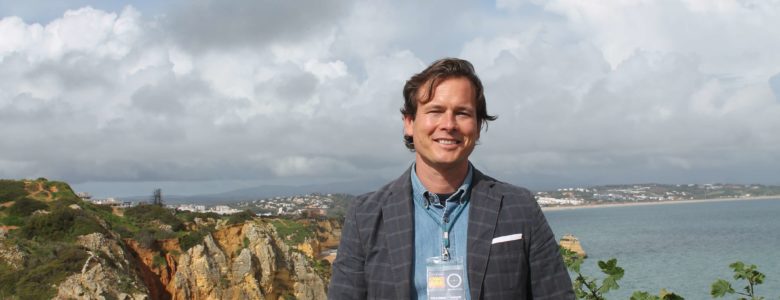
Faces of DiEM: Saving nature from private interests
Jonathan Silva is fighting to prevent the cliffs of Ponta da Piedade in Algarve, Portugal, from being privatised
In this episode of Faces of DiEM, DiEM25 member Jonathan Silva is interviewed by Nadia Sales Grande
“If we don’t act to shape the world [in regards to] the public interest, inevitably other interests will shape the world.”
— Jonathan Silva
One of the first people to contract COVID-19 in Lagos, and having lost his job due to the crisis, Jonathan felt the ramifications of the pandemic. But he used this time to create a non-profit organisation in Portugal in order to protect precious natural heritage in the Algarve region. He explains how upon his return he found that several private construction companies had fenced off this public land. He has released an open letter (which you can sign!) and aims to open a dialogue with the municipality to ensure that the people in the area have a say on how this land is used.
See drone footage of the area Jonathan is fighting to protect.
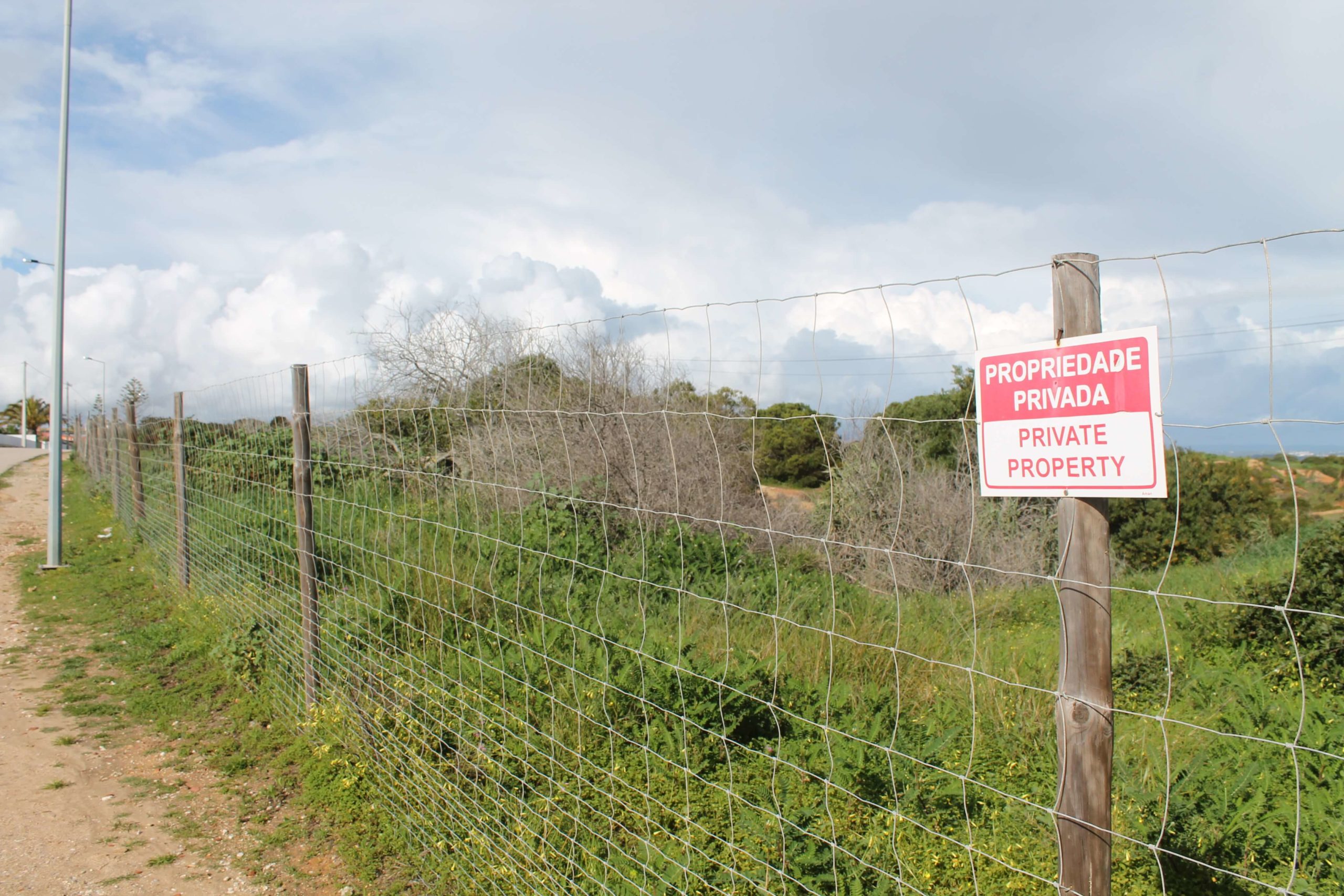
Photo: Area fenced off by private companies.
How can I help?
Learn more about about Jonathan’s campaign!
Sign Jonathan’s open letter to ask the local mayor to protect the cliffs!
Learn more about our Campaign Accelerator programme, a project where we support individual activists to make targeted campaigns on local issues they feel passionate about!

Democratic decay and uncertainty in Turkey
To what will we wake up tomorrow?
This is a question that we have been asking ourselves quite often lately, and here are the reasons why! Although this political uncertainty started over almost two decades ago, we will only tackle the period from 11 March 2020 until today. Why 11 March 2020? Because on 11 March 2020 The Ministry of Health announced the first confirmed COVID-19 case in Turkey.
On top of the already existing political and economic unrest all over the country, the perpetual femicides, the marginalisation of the LGBTQIA+ community, and the systematic oppression of minorities, the pandemic was the icing on the cake!
From 11 March 2020, all people living in Turkey knew that nothing would be the same again
The COVID-19 pandemic has caused lockdowns all around the world. Lockdowns that were implemented by the state, because of the pandemic. We all had to stay indoors, limit our interactions, had to fill a form in order to go out (France), send a text message (Greece) or have an application (that might use your location if you allow it to) on our phone with our very own HES (Hayat Eve Sığar – Life Fits Home) code (Turkey).
The measures would change and adapt often to the rising numbers of cases, according to citizens’ age and chronic illness history. We would wait for the official announcements of the Health Minister Dr. Fahrettin Koca or President Recep Tayyip Erdoğan. To what will we wake up tomorrow?
Then, on 8 November 2020 the Minister of Finance, and son in law of Recep Tayyip Erdoğan, Berat Albayrak resigned allegedly via an Instagram post. Murat Uysal, the President of Turkey’s central Bank was removed from his position by Recep Tayyip Erdoğan and Naci Ağbal was appointed as the new president of Turkey’s Central Bank. To what will we wake up tomorrow?
Then in mid December we were planning our New Year’s dinner table menu and read that alcohol sales were banned during weekend curfews, and although 31 December 2020 would be a Thursday, alcohol sales would be banned nonetheless. To what will we wake up tomorrow?
Then the first batch of 3 million doses of the vaccine developed by China’s Sinovac arrived in Turkey on 30 December 2020. This vaccine was initially being tested on volunteers in Turkey since mid September. On 25 January 2021, the vaccinations started for 80+ seniors, and continued with the elderly and hospital staff. To what will we wake up tomorrow?
Then in mid February, Turkey launched the mission dubbed Claw-Eagle 2 against PKK (Kurdistan Worker’s Party) fighters holed up in the northern Iraqi region of Gara. 13 prisoners that were being held by the PKK died including Turkish intelligence, police and military personnel – during clashes in the area. To what will we wake up tomorrow?
On 17 March, Chief Public Prosecutor of the Court of Cassation filed a closure case against the pro Kurds Peoples’ Democratic Party (HDP) by appealing to the Constitutional Court. The indictment has been sent to the top court. In the indictment prepared by the Court of Cassation’s Chief Public Prosecutor Şahin, there is also a request for a political ban on 687 HDP politicians. To what will we wake up tomorrow?
In the event that the Constitutional Court concludes that the related people, with their statements and actions, have caused the total closure of the party, they shall not be the founder, member, executive or inspector of another political party for five years starting from the day when the top court’s detailed ruling of party closure is published in the Official Gazette. To what will we wake up tomorrow?
On 20 March, Turkey withdrew its signature from the Convention on Preventing and Combating Violence Against Women and Domestic Violence, known as the Istanbul Convention with a Presidential decree published in the Official Gazette. Some have been criticising the decree by noting that It is unconstitutional to withdraw from an international convention with a Presidential decree.
Below you will find quotes of politicians regarding the withdrawal:
Vice President Fuat Oktay has stated:
“We are determined to bring forward our sincere struggle to raise the Turkish women’s prestige and respectability in society to a well-deserved height by retaining our traditional social fabric in the meantime. There is no need to seek a solution outside or copy others for this lofty aim. The solution lies in the very customs and traditions of ours; it lies in our essence.”
Turkey’s Minister of Family, Labor and Social Services Zehra Zümrüt Selçuk has said:
“The guarantee for women is the current legal regulations in our domestic legislation, primarily the Constitution. Our legal system is dynamic and powerful enough to introduce new legislation, if needs be.”
Also on 20 March, Recep Tayyip Erdoğan fired Governor Naci Ağbal from Turkey’s Central Bank, who was appointed in November, and gave the job to Şahap Kavcıoğlu, according to a decree published after midnight on Saturday in the Official Gazette. To what will we wake up tomorrow?
As the COVID-19 pandemic is paving the way for authoritarianism and overall state control, we will keep fighting for our rights
Democracy is in decay, and we are tired of wondering what we will wake up to tomorrow! We will fight for the implementation of the Istanbul Convention by being present. Being present not only mentally, but also physically, on social media, supporting and empowering our fellow comrades in Gender 1 DSC and Gender Turkey 1 DSC. The struggle is ours!
As comrade Fotini Bakadima notes in her recent article: “Attempts like trying to ban the HDP and denying the will of millions of people should not be tolerated by anyone.” We stand in solidarity with our comrades in HDP and their democratic right to elect, be elected and be the voice of the people who vote for them.
In order to get involved, you can sign the petition on our website!
Photo Source: Ahval.
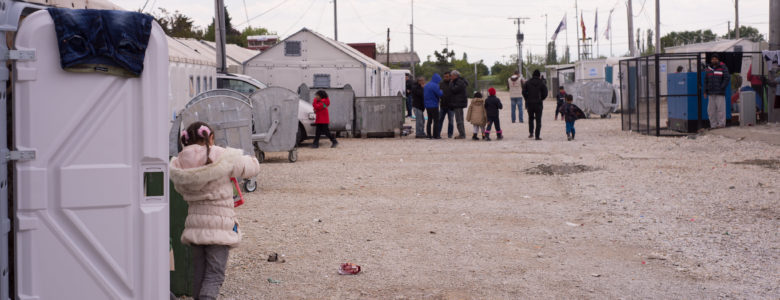
Women and girls are ignored in the pact on migration and asylum of the EU
The Green New Deal for Europe offers a path to justice for migrant women and girls
There is a crisis developing from the way the EU, and especially the European Commission, handles the inflow of migrants: women and girls are ignored in the pact on migration and asylum of the EU.
Women and girls are fleeing their countries escaping wars and economic hardships, fearful for their lives and their bodies. Right now, the majority of EU funds meant to deal with migration is earmarked for selling weaponised externalised borders, especially to Africa. These practices of fortress capitalism are unethical and discredit the EU as a partner in northern and central Africa. The millions spent on weaponising migration could be better spent on programs to combat the causes that endanger so many women, among them the effects of global warming, for which Europe is historically responsible. Solidarity is safety.
The EU migration asylum pact caters to the far-right
The “pact on migration and asylum” of the EU seems to have been written to cater to the far-right and right-wing populist rhetoric. When the pact on migration was released in 2019, the European network of migrant women – ENMW — had this to say : “the new Migration and Asylum Pact fails to acknowledge women and girls — there is practically no mention of female migrants as if this group does not exist and does not make up more than 50% of the global population — and to take concrete actions in protecting them.”
While women as a category is not catered or accounted for, it follows that there would be no accounting for the needs and vulnerabilities of underage and unaccompanied girls, adolescent girls, queer, transwomen, or women and girls with disabilities: an invisibility that exacerbates insecurity and precariousness.
What are women and girls fleeing from?
Women are typically described in their immigration forms in relation to a male figure or a parent: either “their man” (“spouse of”), or “mother”, offering little information that could point to the reasons for their migration and what they may be fleeing from. However, the current trend for migrant women being displaced is that they are increasingly doing so alone or as heads of their households.
Women tend also, among other reasons, to migrate as an escape from domestic violence, unhappy marriages, or the pressures of arranged marriage. Women also often flee for economic reasons or financial pressures. However in the EU, for example, the “skills and talent” migration policy is only targeted at those migrant workers in countries where studying is accessible to girls. For women who have managed to migrate, the UN warned that 3000 cross-border women between Morocco and Spain live in inhumane conditions harvesting fruits — conditions that have been made worse in times of COVID-19.
According to the UN, women suffer disproportionately from climate change’s effects because of gender inequality both at home and professionally. As climate change exacerbates migrations, there are concrete ways in which communities can address the impacts and it makes a difference when women are informed, prepared and empowered.
Aside from climate change, women and girls also escape from conflict, and as the ENMW report states, they break free from “persecution or other situations that endangers their security and dignity, prostitution, forced marriage, rape and sexual abuse, female genital mutilation, exploitation, cultural exclusion, community control, ethnic glass ceiling.” This has tragic consequences on women’s bodies: “It is impossible to meet a Sub-Saharan woman who has travelled to Morocco and who hasn’t suffered from sexual violence on the way or on the border. The rare women who have not been harmed are isolated cases”.
According to the UNFPA report, on top of their reasons for migration, women are positioned in situations that are unfavorable to them as migrants. Women comprise the vast majority of migrant domestic workers which exposes them to exploitation, abuse, and trafficking. In the countries they move to, migrant women are also often exposed to sexual harassment and discrimination while seeking work, housing, or health services. In transit and arriving at their destination, women are continuously faced with barriers and risks.
Addressing migrant women and girls through targeted policies
The European Union should reassess the commission’s work regarding women and girls’ migration policies because their vulnerabilities are neither accounted for nor are they addressed.
The use of border-externalisation is unsafe for migrant women and girls and serves instead to boost the European military-industrial complex, on the one hand, and the admission of a temporary low-cost contractless workforce, on the other. And could this be an indication of the way EU countries may in the future treat Europeans suffering climate change?
Do we owe them reparations for all the fortunes we brought back from their birthplace for centuries? DiEM25’s Green New Deal for Europe proposes the Environmental Justice Commission in order to address this pressing issue.
At DiEM25, we stress that these situations should be carefully analysed in the context of other cultures as well. The instability in the regions where migration starts is too often the consequence of extractivist and neo-colonial policies perpetrated for centuries in the Global-South, to the direct benefit of G7 countries.
It is clear that these problems are all interlinked, and that the continuing confrontational attitude on the part of rich partners (often hidden behind offers of funding) to developing countries and their specific problems must be replaced by a constructive approach that sets all forms of collaboration firmly in a context of respect, absolute equality of human rights, and historical consciousness.
Photo Source: UN Women on Flickr.

Draghi’s hiring of McKinsey is ‘an affront to the Italian people’
The Italian Ministry of Economy and Finance under the PM Mario Draghi hired a strategic consulting multinational to ‘organise’ Italy’s distribution of the Recovery Fund monies
The firm will carry out a study on the ‘Next Generation’ plans for the country and offer technical-operational support of project-management for the monitoring of the various lines of work for the finalisation of the plan.
Much has been said about the value of the 25 thousand euros contract: peanuts for a large company like McKinsey. Be it opportunism, or the desire to get involved in Italy’s recovery, or even sympathy for Draghi’s government and the Italian procurement code, this decision has triggered a wide debate.
The government could have involved Universities and youth organizations through a call for tenders, but apparently this was not in their plans. Article 35 paragraph 2.a of the Procurement code, states that for contracts lower than 40,000 euros there is no need to publish the call for tenders. In fact, McKinsey was assigned the job by direct award, without prior consultation of the contractor with two or more economic operators.
“The government of the best”, as they call it, confirms its oligarchic tendency towards co-optation. According to Yanis Varoufakis in his last interview with the Italian journal La Stampa, McKinsey’s engagement “is an affront to the Italian people’s well-developed sense of decency.”
McKinsey has a controversial past
The US company is involved in the profit maximization of the company Purdue Pharma, to which McKinsey employees had suggested pumping sales of OxyContin, a highly addictive opioid drug, thus contributing to a crisis that has devastated families and communities across the United States, according to a NY Times report.
For Italy’s great recovery plan, the government brings into play the strongest supporters of Milton Friedman’s doctrine: “Conduct business in line with the wishes of shareholders, which is generally to make as much profit as possible”.
We have been told that Draghi’s academic past with Federico Caffè would have influenced his political decisions. Keynesian and expansive policies for the new “magnificent and progressive fate”, quoting Giacomo Leopardi, were presented by mainstream media. As we have seen in the previous article, Draghi is neither a Keynesian, nor a savior of the fatherland.
What we actually understood is that the ancient rule of the Art of War also applies to him: If you know the enemy and know yourself, you need not fear the result of a hundred battles.
That’s exactly what Draghi has been doing in the last few weeks: he hired Francesco Giavazzi (the infamous theorist of the expansive austerity) as economic consultant, but also Sirena Sileoni, deputy director of Bruno Leoni Institute (whose motto is Ideas for the free market), where a paper was published a few months ago claiming that the blocking of layoffs causes a bubble “which sacrifices the freedom of dismissal by companies and the efficient reallocation of productivity which would be ensured in the medium-long term, by the free deployment of the productive forces”. And to conclude (for now) the unexpected contract with McKinsey.
Draghi’s decision comes as no surprise
Back in 2015, as president of the ECB, he had used private legal advice to close commercial bank branches across Greece. In 2015, the European parliamentarian Fabio De Masi asked for access to the agreement and the contents of the legal advice but Draghi said that European taxpayers should not be allowed to access such sensitive documents. Diem’s voice on this topic is still very clear, Release #TheGreekFiles.
But this time there shall be no escape for the government. According to the Italian law, the contract has to be made public (find it here). What we actually need is a collective request to publish the documents provided to the Ministry by the private company. If the government refuses, this will set an alarming precedent that would torment even the most passionate supporter of “The government of the Best”.
A provocation from Yanis Varoufakis stimulated a wave of resentment in some Italian citizens that have lived under two completely different governments in the last two years, with a political crisis at an almost weekly basis.
So predictable, so sad: Mario Draghi hired McKinsey to 'organise' Italy's distribution of Recovery Fund monies. What next? Get the Mafia to re-organise the Ministry of Justice?
— Yanis Varoufakis (@yanisvaroufakis) March 8, 2021
Those same citizens that now deal with Berlusconi’s lawyer undersecretary of the Ministry of Justice, with uneducated undersecretaries of the Ministries of Cultural Heritage and Education, theorists of the free market and expansive austerity as economic consultants of the PM. And let’s not forget Matteo Renzi, the Senator who triggered political chaos by pulling his support from Conte, thus leading to Draghi’s government. Mr. Renzi, has recently received significant money transfers from Mohammed bin Salaman, Saudi Arabia’s Crown Prince, just for saying that Saudi Arabia could be the ideal place for a new Renaissance. After harming the previous government in the midst of the pandemic, Renzi flew to Saudi Arabia for the amount of 80’000 euros, to address as ‘His majesty’ a man accused of killing and cutting journalist Jamal Khashoggi into pieces.
Well, indeed, we need high profile consultants, maybe psychiatrists, to understand how it is possible to accept this situation.
Deceptions are more frequent than real change
In Italy there is seemingly no escape from the political crisis. The technocratic government maintains the frequent excuse that ‘There is no alternative’.
Let’s conclude with a meaningful quote from Another Now:
“The worst form of slavery is that which people consent to for lack of any viable alternative.”
The views and opinions expressed here are those of the author and do not necessarily reflect DiEM25’s official policies or positions.
Photo Source: Philip McMaster on Flickr.
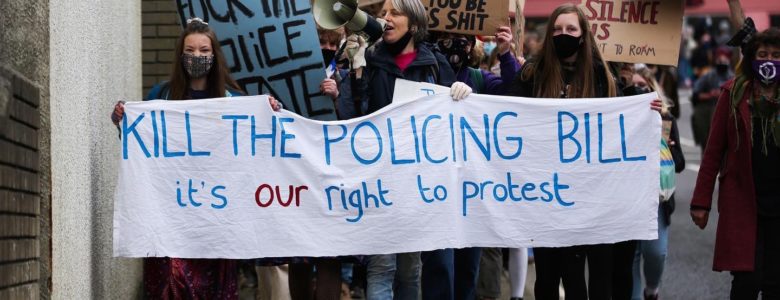
Kill the Bill: A democracy in decline
The past week has seen a series of protests across the UK led by the feminist group Sisters Uncut, which were largely supported by much of the country’s progressive and liberal wings. The movement, labelled ‘Kill the Bill’, was born out of opposition to the Conservative government’s new Police and Crime Bill put forward by Home Secretary Priti Patel, which was set to be passed by the large majority enjoyed by Boris Johnson in the House of Commons.
The bill has been heavily criticised for its focus on increasing police powers against protests
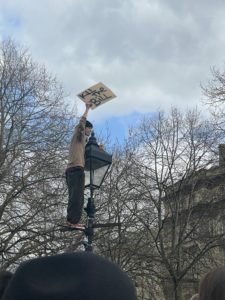
Photo: Kill the Bill protest in Bristol.
Under the terms of this bill, the police could enforce time and noise restraints on protesters as well as criminalise “causing public nuisance” in the course of protest. For many prominent figures in British politics, the bill is a significant step towards authoritarianism and certainly a threat to the people’s right to protest — a cornerstone of democracy and an important part of the Black Lives Matter movement that picked up momentum in the UK last summer. While the Labour Party were initially set to abstain from voting on the bill, a shift in public opinion against it convinced the leader of the Opposition Keir Starmer that it was a threat to be taken seriously.
An important part of the growth of opposition to the bill was the recent campaign targeting male violence against women after the disappearance of Sarah Everard in London at the beginning of March
In the wake of this tragedy the movement’s hopes for reform were shattered by the extreme and seemingly performative response by police to a vigil held in Sarah Everard’s memory. The crowd was forcefully dispersed and several women were arrested. Pictures of policemen forcing women to the ground — at the vigil of a woman murdered by a policeman — shocked the nation and accelerated concerns over police powers and the government’s neglectful attitude to the demands of protesters. The bill does very little to target male violence and protect women, and in fact suggests that damage to memorials could result in up to 10 years in prison. This is in part a response to the toppling of statues, such as that of a slave trader in Bristol in June 2020. What is shocking is that it is potentially a harsher sentence than a man could receive for rape.
With Johnson’s 80-strong majority, it was never likely that the passing of the bill could be avoided altogether — even within his party, critics like ex-prime minister Theresa May voted it through despite vocal concerns. However, the ‘Kill the Bill’ movement succeeded in at least delaying the implementation of the bill, a significant achievement for Sisters Uncut given the disadvantages weighed against them — and a victory for peaceful protest.
Following events in Bristol on Sunday night, a large portion of public opinion in the UK seems to have once again shifted. A peaceful Kill the Bill march during the day descended into a chaotic mess after the sun went down, with police vehicles set alight and several officers injured by a minority of violent attendees. While the use of violence is entirely unhelpful to the movement’s ends, it is too easy to brand the chaos in Bristol as simply the excitement of a thuggish mob. The specific repercussions of the violence of Sunday evening are yet to be determined, but the charged tension of discourse surrounding it and the sudden demonisation of the protesters may be a cause for concern, as a sign of what may be to come under the new bill.
When people feel they don’t have an active say in democracy, and they are stripped of the right to protest peacefully and meaningfully, what happens?
Take the recent protests in Russia following the arrest of opposition leader Alexei Navalny, for example — policing of illegal protests quickly became violent as the police struggled to enforce protest laws which aimed to silence dissidence. Chaos ensued. In the UK, a woman was murdered by a police officer just weeks ago and her vigil was roughly broken up by more uniforms. Meanwhile, the government is attempting to pass further law restricting the right to protest peacefully, and the opposition leader is taking no initiative when it comes to challenging the government on the behalf of progressive movements.
In this sort of environment. It is therefore hardly surprising that, stripped of the possibility of peaceful political expression by the approaching bill, a minority of activists will eventually turn to more disruptive and even violent methods. Whether this is what happened in Bristol is unclear; even unlikely. But it may well be a premonition of grave things to come. Meanwhile, the reaction of mainstream British politicians has been dismissive at best, exploitative at worst — the situation is thought to have provided further basis for Patel’s continued campaign for the bill, which would only render the conditions witnessed in Bristol all the more volatile.
If Boris Johnson truly wants to re-establish Britain’s role in the world, it has to be done, not through an ambitious defence review and nuclear arms boost, but through acting as an example of strong democratic principles in the face of humanity’s greatest problems. Climate action, Black Lives Matter, women’s rights — these issues run the risk of being neglected by the existing structures that make up government, parliamentary politics and capitalism, and therefore they can only be decided by the people’s ability to make themselves heard.
Given the inertia and the built-in biases of the democratic system in the UK and elsewhere, the right to protest is an essential part of our future
For this, progressive forces must maintain the pressure on this bill and any others which arise to challenge the right to protest. DiEM25’s call for the strengthening of democracy across Europe is deeply connected with the struggle for political freedom of expression — democratise, or expect disintegration.
The views and opinions expressed here are those of the author(s) and do not necessarily reflect DiEM25’s official policies or positions.
Photo Source 1: Cameron Smith on Twitter.
Photo Source 2: Georgie Emily on Twitter.
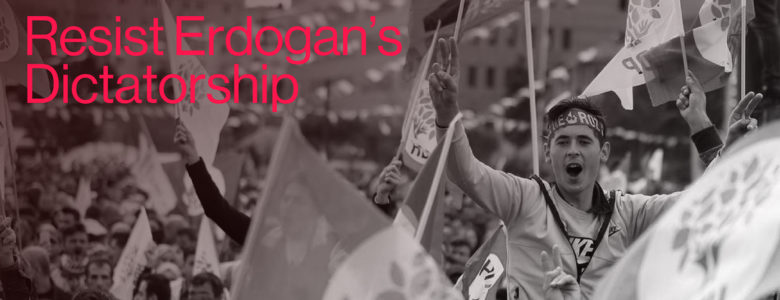
Democracy and HDP are victims of Erdoğan with the EU as witness
There is no doubt that what we are witnessing in Turkey consists of a violation of democratic procedures, personal and political rights, and the country’s international obligations as a member of international organisations such as the Council of Europe.
The EU has witnessed a gradually augmenting pressure against the HDP by the Turkish government, the continuous struggle to characterise it as a “terrorist party” and the claims of Turkish officials regarding its ban. This whole process was followed by the latest attack against the third largest party of the country made by the Chief Public Prosecutor of the Court of Cassation that filed a lawsuit with the Constitutional Court to ban the HDP, as being a party that fosters and supports terrorism.
On the very same day, the government — on the basis of political calculations and in violation of the law — stripped HDP member of parliament Kocaeli Ömer Faruk Gergerlioğlu of his status as deputy. As an activist and a politician, Gergerlioğlu fought against the violation of human rights in Turkey and has dedicated many years in the struggle against discrimination both in his electoral district and in the whole country. But his actions were considered revolutionary and he was accused of “fostering terrorist actions” after a controversial social media post. The fact that his immunity was lifted even though his case is still pending in court renders this whole act even more scandalous from the part of the Turkish coalition government.
Unfortunately, HDP politicians have been the victims of political prosecution many times
Dilek Hatipoğlu was sentenced to 16 years and 3 months in prison on 25 March 2016, and her sentence was upheld by the Supreme Court, whilst Selahattin Demirtaş and Figen Yüksekdağ are already in prison. Also, the party’s deputies that are under attack are Fatma Kurtulan, Garo Paylan, Hüda Kaya, Sezai Temelli, Pero Dündar, Serpil Kemalbay Pekgözegü, deputy chairpersons of the HDP’s parliamentary group Meral Danış Beştaş and Hakkı Saruhan Oluç, and its co-chair Pervin Buldan. It is interesting to take note that more than 800 summaries of proceedings have been brought to the Turkish Parliament for HDP deputies since the 2018 elections.
This attempt by Recep Tayyip Erdoğan to ban HDP is just the tip of the iceberg, since all these years there have been a series of attempts to marginalise, victimise, imprison and even torture politicians, academics, artists and citizens in Turkey. Despite witnessing it all the international community has chosen and still chooses to remain silent.
It needs to be mentioned that last December the European Court of Human Rights’ Grand Chamber ruled against Turkey on Demirtaş’ case, asking for his immediate release. They noted that the Turkish government pursued an ulterior purpose of preventing him from carrying out his political activities, depriving voters of their elected representative, and “stifling pluralism and limiting freedom of political debate: the very core of the concept of a democratic society.” In spite of this decision there was not sufficient pressure put on Turkey for his release.
So, by meeting no significant European or international reactions the Turkish president continues to instrumentalise prosecutions and imprisonment as a means of intimidation and removal of his opponents from the political arena of the country. As long as this practice isn’t criticised and condemned by all democratic countries, pressure and prosecutions will continue.
Attempts like trying to ban the HDP and denying the will of millions of people should not be tolerated by anyone
Attempts like this show that democracy, respect of human rights and freedom of speech are elements that are at stake in Erdoğan’s Turkey and this is why European and international democratic forces need to react immediately, not only to support and show solidarity to HDP but, also, in a struggle to save democracy itself.
In order to get involved, you can sign the petition on our website!
Fotini Bakadima has authored this article on behalf of the CC.
Fotini is an MP of MeRA25 (Piraeus 2nd District), and a member of DiEM25’s Coordinating Collective.
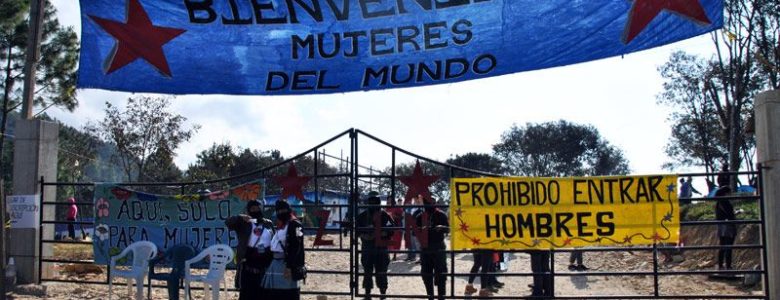
Sexual and gender based violence: Lessons from Chiapas, Mexico
“Miremos en silencio, aprendamos a oír, tal vez después, por fin, seamos capaces de comprender.”
— José Saramago, Our Word Is Our Weapon, 2002.
Recently, the Taskforce on Feminism, Diversity and Disabilities published two articles focusing on the increase of sexual and gender-based violence (SGBV) during COVID-19 and anti-trans violence that highlighted the lack of safety women and transwomen suffer but also that this crisis is not limited to a few countries or regions of the world.
The United Nations’ Declaration on the Elimination of Violence against Women: defines violence as “[acts] that result in, or are likely to result in, physical, sexual or psychological harm or suffering to [human beings], including threats of such acts, coercion or arbitrary deprivations of liberty, whether occurring in public or private life.”
European countries claim to have freedom but women and trans women are murdered every day because of violence by men — from partners, to neighbors, family members, workmates, and strangers. This is on top of the discrimination, exclusion, erasure, and psychological and sexual violence that is prevalent in patriarchal societies.
When it comes to addressing SGBV, governments have not given it the priority and effort they needs compared to the way other societal issues are systemically prioritised such as lending half a trillion euros to bail out the banks, spending billions of euros per year to keep occupying foreign countries, or closing and militarizing the borders in the name of “security”.
If nation-states are not able to guarantee basic rights for everyone, what are our options?
In Chiapas, Mexico’s poorest state, a group of mostly indigenous people has been working for decades to create an alternative that offers other possibilities. This revolutionary group has understood from the very beginning that the success of their struggle was intimately tied to women’s liberation.
This feat is even more impressive given that Mexico not only has one of the highest femicide rates in the world, but is also a repressive State, and a society where patriarchy and colonialism play a significant role in women’s oppression. Even the way protests are covered by the media puts more focus on the protection of property than on human suffering, as was the case when feminists took over the National Human Rights Commission (CNDH) offices in Mexico City, demanding the CNDH to defend women’s rights and provide assistance to survivors. The fact that the offices were converted into a women’s shelter where they also offered legal counsel was mostly ignored.
A Different Kind of Revolution
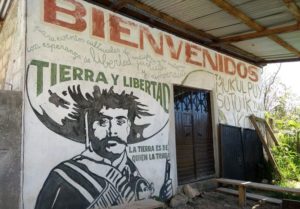
Photo: Mural of Emiliano Zapata by Road2Help.
This revolutionary group goes by the name of Ejército Zapatista de Liberación Nacional (Zapatista Army of National Liberation), whose members and supporters alike are typically referred to as Zapatistas. From their inception, the Zapatistas understood that they could only achieve freedom if everyone became free, and that included being free of violence. With this in mind, they collectively agreed that women’s liberation needed to be one of their core tenets before rising up in arms and published their revolutionary women’s law, establishing a leadership that is half composed of indigenous women.
“It is clear to us that transformations must not focus only on material conditions. That’s why for us there is no hierarchy of spheres; we do not claim that the fight for land has priority over the gender struggle, nor that the gender struggle is more important than the fight to recognize and respect difference[s].
Instead, we think that all types of emphasis are necessary and that we must be humble and recognize that currently there is no organization or movement that can boast about covering all aspects of the antisystemic—that is, anticapitalist—struggle.
This recognition is the basis for our Sixth Declaration of the Lacandon Jungle. It sets out by recognizing and accepting the breadth of our dream and the narrowness of our strength.”
— Subcomandante Insurgente Marcos, 2008 speech recorded in The Zapatistas’ Dignified Rage, 2018.
The Zapatista men took these laws seriously and obeyed them in solidarity with the women, including giving up alcohol — which was forbidden by the revolutionary women’s law as its abuse usually translated into domestic violence. Now, decades later, the Zapatista women are proud of living without fear of being killed in their territories. Florinda, a 15 year old Zapatista, explained during the second international gathering of Women who struggle (an event only for women organized by Zapatista women where “no men are allowed, even if they are good men or normal men or whatever men” that focused on violence against women):
“In the Caracoles, there aren’t women who are beaten by their husbands, nor murdered, because, among us women, we support each other, and also; drinking alcohol is prohibited… we also have the same rights as men have.” (in Spanish).
However, this achievement did not happen quickly nor easily, as Subcomandante Insurgente Galeano recalls in “The Vision of the Vanquished”. The Zapatistas are also aware that no matter how much progress they have achieved, there is always more that needs to be done. They start by admitting not to have all the answers and asking questions first, as they did a couple of years ago when they posed these questions to a group of scientists from 11 countries:
“What do you think about the fact that they use us [women] as publicity for their propaganda and their transport of drugs, and as objects to satisfy their sexual needs? That they prostitute us to sell articles to make money?”
So, how can a group composed mostly of historically oppressed and economically exploited people, under constant attacks by the government and paramilitary groups, be able to achieve the seemingly impossible, while governments with resources, funding, and facilities cannot fulfill their responsibility of protecting the safety of their citizens?
We need to ask ourselves what is causing these acts of violence and domination, who is committing these actions, and why they keep happening
It should not only be our States and political leaders who are under scrutiny. We should also be critical of ourselves; after all, if laws were enough there would not be any crimes.
For instance, patriarchal culture is mostly focused on survivors, e.g. we tell our daughters to be careful, but we do not teach our sons to not harass, assault, nor rape. The rare cases when society goes against the perpetrators, it does so on an individual level instead of recognizing the systemic and systematic issues taking place. An example of being critical of our society can start through this thought experiment by Natalia Zeller asking what are the answers if we asked men what they would do if there were no women for one day; and compare that to the answers given by women. Why are we, as a society, not outraged by how unsafe women feel walking alone in the streets? And more importantly, what are the individual and collective actions that we must make to eradicate the violence that disproportionately affects women?
If there is something we can learn from the Zapatistas, it is that these issues cannot be resolved through policies and laws alone. The Women’s Revolutionary Laws are a success not because they are laws, but because the communities agreed that those were basic rights for everyone and are followed without coercion, using self-organization, mediation and restorative justice instead of a punitive approach. If this can be done in Chiapas, Mexico, what is preventing us from doing it everywhere?
We should not be discouraged from searching for the answers to these questions, but be motivated by the opportunity to do so and to envision a safer society for all. In doing so, remember to actively involve everyone, especially those who are the most affected by our decisions.
We demand femicide to be internationally recognized as a crime against humanity. Through this, gaps in justice and criminal systems can slowly be addressed. In addition, we also invite everyone to sign this petition by the Kurdish Women’s Movement in Europe that draws attention to the femicidal policies by the AKP Party in Turkey.
The Gender 1 DSC at DiEM25 will be launching a campaign addressing SGBV in 2021 as part of our ongoing work to raise awareness on the issue. Contribute to shaping our campaign, or find ways we can support each other by contacting the Taskforce of feminism, diversity and disabilities: [email protected].
Featured Photo: A picture of the international gathering for women organized by the EZLN showing signs that read “welcome women of the world” and “men are not allowed”.
Photo Sources: Road2Help.
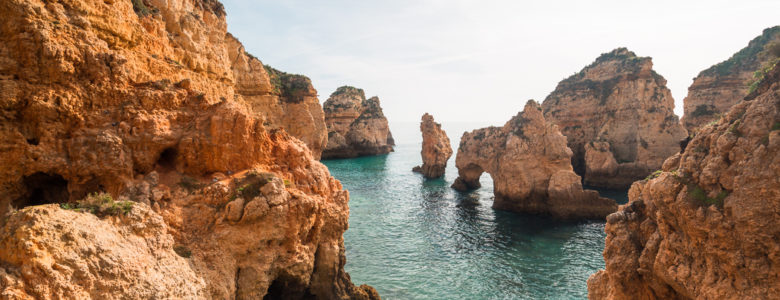
Private interests may destroy part of Portugal’s natural beauty – let’s stop them
The cliffs of Ponta da Piedade in Algarve, Portugal are one of the region’s best known natural attractions. They are not only a local landmark but also a unique heritage site, visited by thousands of people each year.
But now, a large part of this land has been fenced off by private interests, who are seeking to develop it. This would destroy the beauty of Ponta da Piedade, and block access to public visitors.
I’m an author who grew up in the area, and a DiEM25 member. Since I was a child, I have hiked these cliffs and have a strong personal connection to them. I believe they should be preserved and remain accessible to the public, so future generations can enjoy them too.
So I assembled a group of local citizens to save the area, and we have started a campaign.
The challenge

Photo: Fenced off area around the cliffs encroaching on public land.
The municipality has already begun drafting plans to develop this area, and large portions of the cliffs have recently been fenced off by private interests. One of these is a large construction company, which is advertising the land for sale with possible construction permits.
The fences reach all the way to the edge of the cliffs, illegally encroaching on public land, and preventing residents or visitors from fully enjoying the area surrounding the cliffs.
Our proposals
We want to stop any development plans the municipality may have already started, and open a dialogue between the municipality and the local community to discuss how best to preserve this unique natural area.
So we are sending an open letter to the municipality, requesting:
- Safe access to the cliffs by removing the fences
- Withdrawal of any current development plans for the cliffs, or construction permits
- A public consultation so the community can decide with the municipality what should happen with the area. The community should have the right to vote for different project proposals as to how the area could best be used or developed
We are asking anyone who is interested, to join us in signing the letter.
If we do not shape the world with the public interest in mind, then it will be shaped by other interests, who typically do not have the benefit of the community at heart.
We need your support! If you want to help save Ponta da Piedade for the benefit of the community, preserve nature, and give citizens a say in what happens to their area
This campaign is part of DiEM25’s Campaign Accelerator project.
DiEM25 members are currently discussing possible actions to address the issue discussed in this article. If you’d like to be involved, or if you have knowledge, skills or ideas to contribute on this, get in touch.
Photo Source 1: Photo by Nadia Sales Grade.
Photo Source 2: MetropolitanSpin.
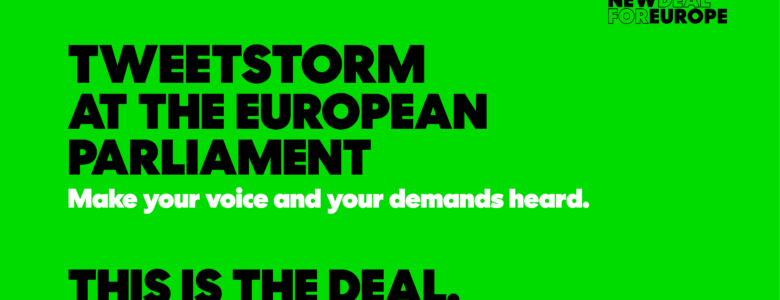
Green New Deal for Europe (tweet)storms the European Parliament TODAY!
Join us in storming the European Parliament!
Opposed to the “Green Deal” by the European Commission, which is neither new or green, our Green New Deal for Europe promises to establish fairness, economic justice and sustainability to our continent – and the world.
For 10 days we’ve been showing how The Green New Deal for Europe (GNDE) recognizes our social and ecological problems and presents solutions for them. Our Twitter, Facebook and Instagram accounts transformed into fountainhead of transition proposals. Now, we are moving forward with a new action!
A message from @DiEM_25 co-founder @yanisvaroufakis.#GNDE #RealDeal pic.twitter.com/nzyxZv8qNh
— Green New Deal for Europe (@gndforeurope) March 16, 2021
To mark the Global Climate Strike today, we’ve turned our GNDE goals into tweet-sized demands and will direct a tweetstorm at the European Parliament’s account (@Europarl_EN).
How can you help? It’s simple:
- Open this document
- Pick a tweet from the “Tweet” column
- Copy, paste and tweet to the European Parliament!
Europe’s green transition must not be top-down
We are advocating for the weight of green transition not to fall on the shoulders of working families. It must empower citizens and their communities to make the decisions that shape their future.
The beauty is in the fact that our vision is both revolutionary and realistic!
We cannot afford to wait around: we can begin to build the just transition today. This campaign aims to show how. We stand with Europeans across the continent.